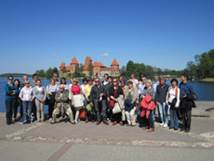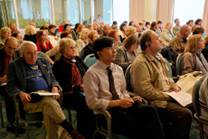Productive Learning Development in Lithuania
I thought I will never be able to understand what does the life wants
from me, but now I know how to create my own life. (Productive Learning student)
Productive Learning was presented to the Lithuanian education community as a pilot initiative within the “Alternative Education” Project in 2012.
At that time, three Productive Learning classes were opened in Kaunas Rokai Secondary School, Kedainiai Youth School and Panevezys District Paistrys Secondary School. Two Productive Learning teachers at each school worked with the group of 10-15 9th graders. |
 |
 |
Experts from the Institute for Productive Learning in Europe (IPLE, Germany) and local education professionals from the Education Supply Centre (ESC) of the Ministry of Education and Science (MoES) were assisting in a two-year programme of the implementation of Productive Learning mainly helping with teachers’ education. Currently, ESC is responsible for school consulting regarding Productive Learning and teacher training. |
| National legislation is also being developed according to the needs of the Productive Learning practice: the Description of Procedures of Implementation of Productive Learning, requirements for Productive Learning teachers, the National Qualification Program for Productive Learning Teachers, etc. |
At the moment there are five schools implementing Productive Learning in Lithuania:
- Kedainiai Adult and Youth Education Centre
- Prienai Revuona Basic School
- Telsiai Adult School (Youth Education Department)
- Ukmerge Uzupis Basic School
- Ukmerge District Siesikai Gymnasium
|
 |
To sum up, the following table shows the development of Productive Learning in Lithuania:
Year |
Stage |
Results |
2012−2014 |
National initiative: Pilot Project “Alternative Education” |
- 3 schools
- 6 teachers
- 36 students
- 48 practical learning sites
|
2015−2017 |
School initiative |
- 6 schools
- 13 teachers
- 70 students
- Over 100 practical learning sites
|
| 2017−2018 |
- 5 schools
- 9 teachers
- 65 students
- Over 100 practical learning sites
|
2018-2019 |
- Few new schools would like to start Productive Learning
|
Research and publications
Several research were conducted and books published introducing outcomes of implementation of Productive learning and its impact on educational process:
- Case study of the Implementation of the Productive Learning Model in Lithuanian Schools
- First Stage of the Case Study conducted by Aukse Petruskeviciute. Association of Social Pedagogues of Lithuania. 2013
- Second Stage conducted by dr. Asta Lapeniene, Dangira Luksyte. Vytautas Magnus University. 2014
- Doctoral dissertation by Aukse Petruskeviciute: Redistribution of Power during the Educational Interaction in the Context of Productive Learning: Grounded Theory. Lithuanian University of Educational Sciences. 2015
- Productive Learning: an Educational Innovation in Lithuanian Education System. Dr. Milda Bredikyte, Aukse Petruskeviciute, Simona Plienaityte, Elena Stasiuliene. 2015
- Productive Learning: Cohesion between Theoretical and Practical Learning. Aukse Petruskeviciute. 2015
- Towards Variety of Education: Productive Learning in Lithuanian Educational System. A policy brief initiated by MoES and prepared by dr. A. Petruskeviciute and S. Plienaityte. 2016
Dissemination of Productive Learning
Significant presentations and talks about Productive Learning practice in Lithuania were delivered:
- Alternative Education: Tackling the Problem of School Dropouts. Presentation at the ET2020 Working Group on Schools Policy of the Directorate-General for Education and Culture (European Commission). Simona Plienaityte, February 2015, Brussels
- Productive Learning: A New Tool to Combine School and Work Life in Lithuania. Presentation at the conference Advice on apprenticeship and traineeship schemes with ESF support. Aukse Petruskeviciute, June 2013, Brussels
- A Brief Introduction to Productive Learning. Presentation at the conference The Role of VET in Reducing Early Leaving from Education & Training. Simona Plienaityte, June 2014, Thessaloniki
24th INEPS Congress in Vilnius
 |
The 24th INEPS Congress Productive Learning: Another Way of Thinking was held on 6-10 May 2012 in Lithuania. Lithuania was selected to host the 24th INEPS Congress in 2012 due to active promotion of alternative education ideas in the country and the start of the pilot implementation of Productive learning in some local schools. |
The Congress events were organized in Vilnius, the capital of Lithuania, and in Kaunas, the second largest town. During four days, about 200 people participated in the Congress events: 34 INEPS members from 9 countries (Finland, France, Germany, Greece, Russia, Spain, Sweden, the USA, and Lithuania) as well as 150 local education professionals.
More about the 24th INEPS Congress in Vilnius.
|
  |
Contact us:
Education Supply Centre of the Ministry of Education and Science
Gelezinio Vilko St. 12
LT 03163 Vilnius, Lithuania
Tel. +370 5 264 9472
E-mail: simona.plienaityte@sac.smm.lt
About the “Alternative Education” Project
| The Productive Learning pilot was implemented within the framework of the Project “Alternative Education” which aimed to create conditions for development of alternative education, to implement its ideas and to introduce alternative education methods at school. |
 |
The Project “Alternative Education” was initiated by MoES and implemented by ESC. By implementing the Project “Alternative Education” the ESC cooperated with schools trying to invent alternative teaching and learning methods and to reduce the number of drop-outs.
The “Alternative Education” was a constituent part of the Education Improvement Project + (EIP +).
EIP+ was drawn up aiming at the implementation of Priority Axis 2 “Life-long learning” of the 2007–2013 Human Resource Development Operational Programme and Priority 2 “Quality and accessibility of public services: health, education, and social infrastructure” of the 2007–2013 Operational Programme “Promotion of Cohesion”. The “Alternative Education” project was financed under the Human Resource Development Action Program by the European Social Fund Agency and from the budget of the Republic of Lithuania. |
|